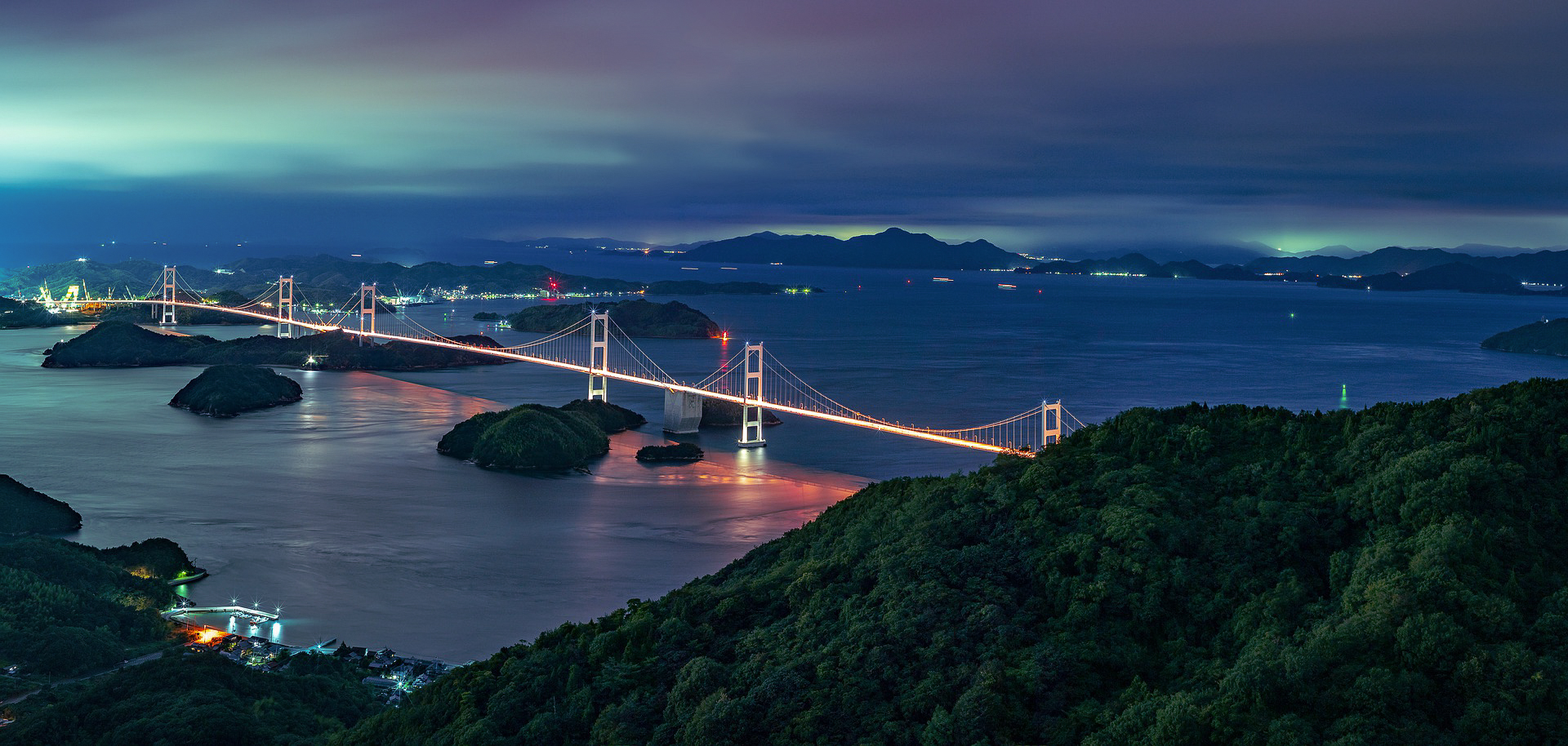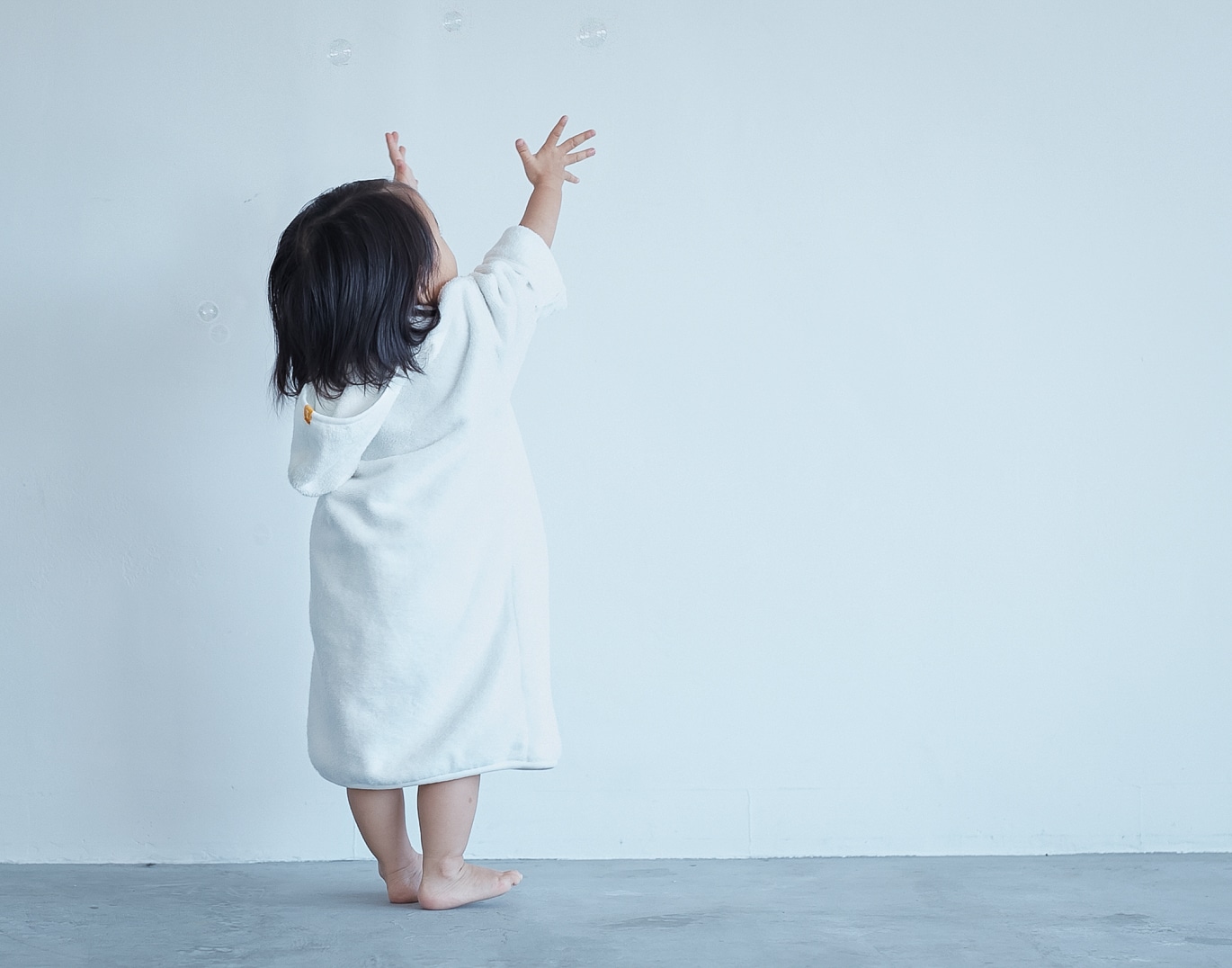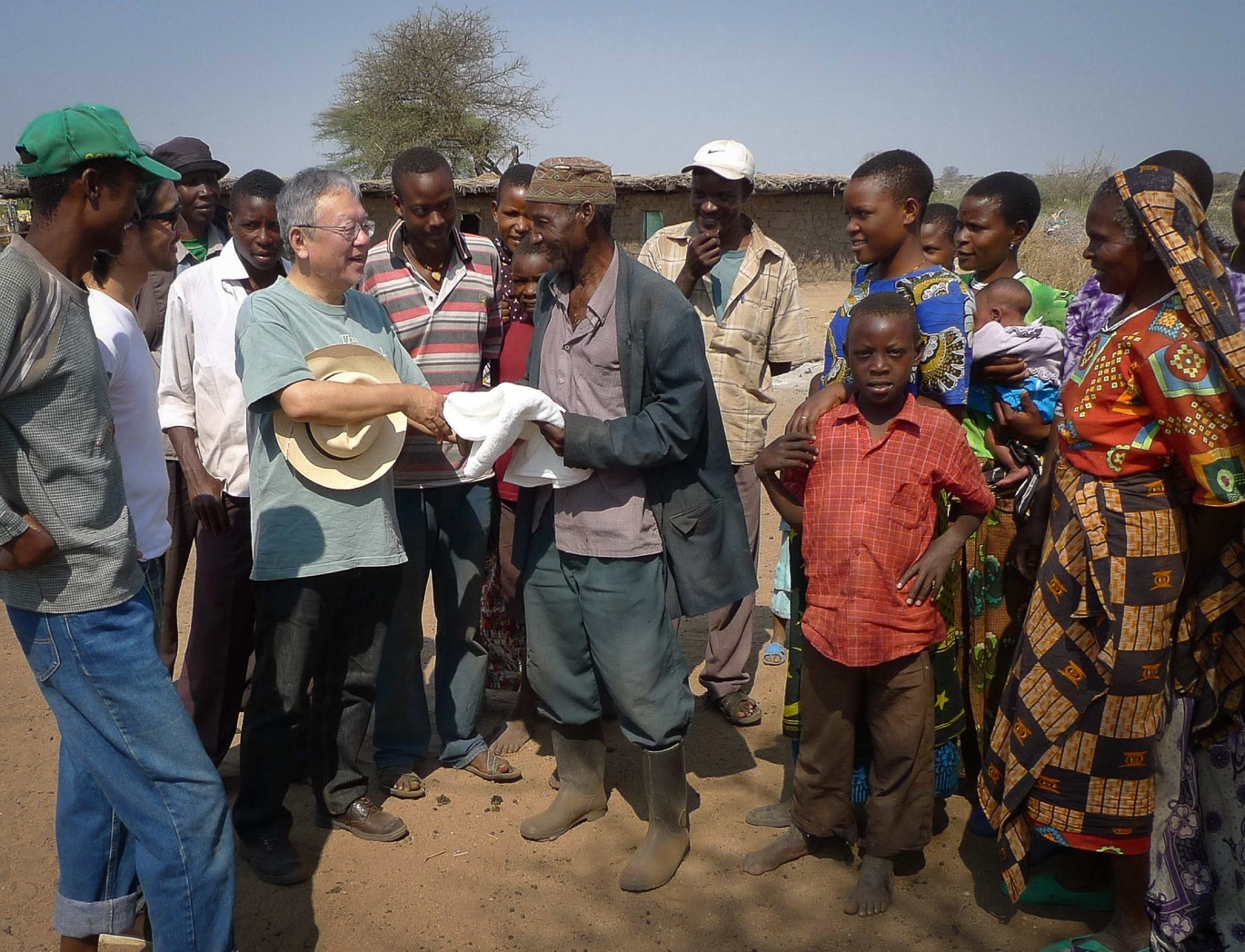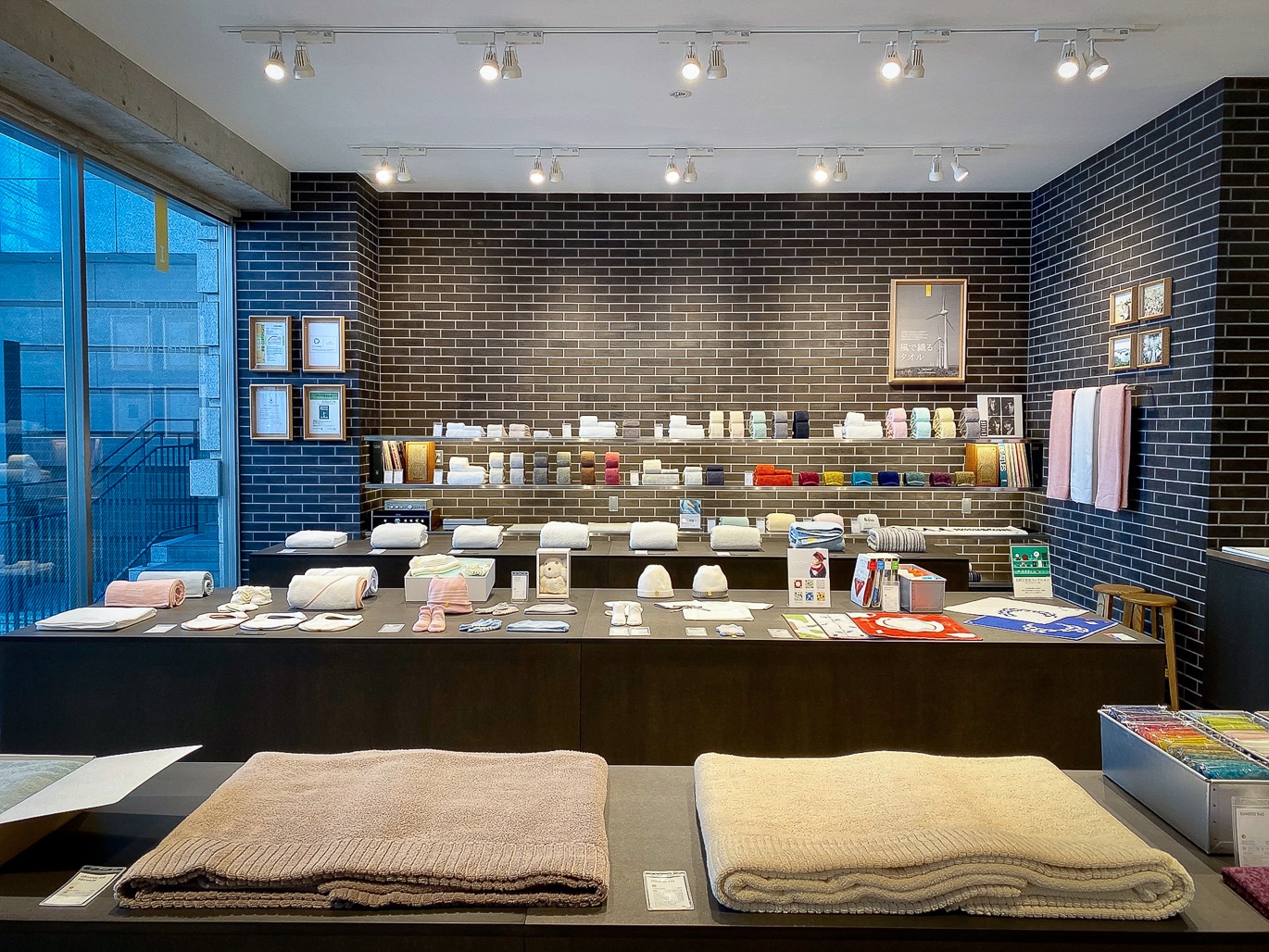Keishi Ikeuchi is not your typical Japanese company man. If he was, we’re certain that one of the world’s most remarkable businesses would not exist today. But it has taken a uniquely Japanese concept, ikigai – or ‘reason for being’ – to get here. Ikigai unifies every thought and action to a meaningful end, and you can’t fight it.
The story of his eponymous organic textile company reminds us of the nishikigoi legend, a well-known proverb about the rewards of ikigai. Where other symbols fill a crowded pantheon for luck-seekers afoot the path of least resistance, the nishikigoi, or koi, are cultural symbols for determination.
The koi metaphor descends from their defiant swim upstream to leap up a waterfall. They are surrounded by naysayers and hecklers, who even raise the height of the waterfall to make the task harder. But the strong nishikigoi persevere and succeed, and are each rewarded by being transformed into a dragon.
Keishi, though, is not interested in mythology. His goal is organic textile perfection – what he calls a ‘life towel’, as emblematic as the Apollo missions or Magna Carta. He wants to show the world that true luxury exists only at the vertex of human fellowship and environmental harmony. He tirelessly demonstrates it is not just achievable, but a critical ecological and ethical necessity.
True purpose, it seems, can only be found atop of waterfalls. By exploring the story of Ikeuchi Organic, we hope to cop a few sprays of wisdom.
Related: To read all about Ikeuchi’s products, see The ecology of luxury: Australia’s best cotton for bath & baby.

Into The Mist
Born in Imabari, Keishi Ikeuchi attended university in Tokyo, and stayed for a solid formative career in audio technology. Early on, he learned about product innovation and multi-national business during his time at Matsushita Electric (now Panasonic).
Throughout this time, he expressed no interest in joining his father’s company, little-known Ikeuchi Towel Co Ltd, founded by Tadao Ikeuchi in 1953.
Entering his 30s, however, a new sense of purpose tugged at his suit. He stirred the waters of change by resolving to leave Matsushita, but would-be suitors at Yamaha, Sony and Pioneer failed to eventuate. So the Beatles-loving audiophile decided he would return home to Imabari and surprise his father by joining the family business. He planned his return to coincide with an Ikeuchi Towel milestone.
In 1983, while he was still away finalising matters at Matsushita, his father suffered a heart attack and died a week later, just seven days ahead of his company’s 30th anniversary.
Devastated, Keishi Ikeuchi found himself in charge, with big responsibilities, small asset holdings, and staring at a blank page.
Why blank? Tadao Ikeuchi had never thought to document any of his specialist towel-making knowledge. It was all filed neatly in his head when he passed. The younger Ikeuchi knew nothing about towel making, so his first task was to piece together blueprints of a three-decade operation. Imabari, too, wasn’t the glistening seaside hub we know today, punching above weight. Despite a lively history specked with castles, pirates & strategic importance, it trod a protracted road to post-war convalescence. If this was the purpose for which Keishi Ikeuchi searched, it had the clarity of mist.

Against The Current
Up to this point, all Ikeuchi Towel sales were exports, the inverse of other Japanese towel companies. This became a problem in the 80s with the rise of cheap factories in China and Vietnam, to which Ikeuchi’s contemporaries flocked because of lower production costs. Anything perceived as the same product – such as a ‘towel’ – was too expensive to make in Japan. True Japanese towels were considered non-viable.
Japan experienced a hypersonic 1980s, with GDP second only to the USA and the highest GDP per capita in the world. Some even speculated that the Yen could replace the US dollar as the apex global currency. Competition was fierce, and Japanese power-suits not comfortable with taking full advantage of ‘progress’ by beating down their cost base ad infinitum could expect to be drowned by the voices of conformity.
What does Keishi Ikeuchi do? Was it time to make bland towels in a foreign city via accountants? “There was no way to survive in Japan,” he says, “other than to make products no one else could make.” Basically, the son-of-a-gun was going to jump up a waterfall.
He started by leading his company to a technical advantage. They were first in Japan to utilise Jacquard weaving technology, and the first towel manufacturer to employ CAD (Computer Aided Design) software. High-quality, reliable towels gained decent wholesale buyers.
In 1989, Ikeuchi played around with their first green product ideas. Although the results weren’t earth-shattering, the company was better for their time in the sandbox.
Three years later they took a leap forward, co-building an ambitious dyeing factory in nearby Saijo City, a 50 minute drive south of their factory. Perfectly placed on the Seto Inland Sea, the opportunity came conditionally with the strictest wastewater regulations in the world. By sheer necessity, the place had to be impressive – and it was.
The scale of this project alone showed commitment to a long-term ecological strategy.
But Japan had sailed too close to the sun, provoking their malignant Lost Decade, the 1990’s, which rusted everything to the floor. Over-inflated property and other asset bubbles burst, taking the forewind out of the nation and multiplying austerity for all. It was not the time to be in business.
If there was no easy niche for Ikeuchi during the boom, then why even look a recession in its jaundiced eyes? For many, this would’ve been the time to walk away, throwing excuses around like grey confetti.
He was my drinking buddy… We shared the same vision.
Voice From The North
During this time, ecological cotton pioneer Leif Nørgaard was in Japan. President of Danish eco-textile company Novotex and founder of its subsidiary Green Cotton, Nørgaard spent his career championing for balance between human needs and the environment.
While delivering a lecture in Japan, Nørgaard expressed his view that Japan did not have the infrastructure to produce pure cotton products. He was politely corrected by a member of the audience, who informed him of Ikeuchi’s new dyeing factory, which in fact superseded all the specs for Nørgaard’s dyeing method. Skeptical that such an advanced facility could exist in an off-centre town like Imabari, Nørgaard headed south to see for himself.
He was received graciously by Keishi Ikeuchi, who gave him a tour which ended with the Dane’s nod of approval.
Nørgaard, who was to pass away in just his 47th year in 2002, was an energetic figure. He loomed largest in an emerging industry that he seemed to haul forth on his own shoulders, compelling everyone else to catch up. We get the sense that Keishi Ikeuchi was one of the few who could keep up with the eco-legend.
“He was my drinking buddy,” a contemplative Mr Ikeuchi tells us. “We had a lot of things in common. Most importantly, we had the same vision.” The two sentinels of global environmental solutions would meet over sake, jovial and prescient, sharing a vision that no one else could see in such high-definition. If you’re lighthearted enough to entertain some hyperbole, this was arguably the industry equivalent of Beethoven meeting Mozart. The friends stayed in close contact.
Nørgaard exerted considerable influence on the Ikeuchi Chairman. Ikeuchi adopted the low impact dyeing method developed by Nørgaard’s Novotex, which they use to this day. Ikeuchi’s once diligent tip-of-the-hat to technical and environmental data flourished into an all-consuming system of ethical standards and green innovation.
Ikeuchi Towel not only battled through the infamous decade, but ended it with a novel product called Organic 120, released to a low-key but positive reception in 1999. This was the first pleasing iteration of Ikeuchi’s environmental shift.
Though it wasn’t the 90s anymore, anvils of debt and shrunken spending routinely destroyed Japanese companies who carried too much damage into the new millennium.
Ikeuchi wasn’t immune to the fallout and had serious financial woes. By this point, Keishi himself wondered whether he steered the ship towards lush new land, or headed for the rocks.
He defaulted to intuition. “As long as there are people who believe in our products,” he says, “I will keep moving forward.” The fruit of this positive philosophy was soon to save his company.
[Ikeuchi are]…showing all Japan that big dreams are possible.
Back In The Green
The 2000s lumbered into view, but Ikeuchi worked at their own brisk pace, continually assimilating environmental technology and ecological philosophy. In 2001 they were first in industry to attain the highest Class 1 of Oeko-Tex Standard 100. The following year they became Japan’s first ever company to power their entire operation with renewable wind energy.
But it took a personal visit from Japan’s Prime Minister Junichiro Koizumi in January 2003 to weigh the future of the emerging organic towelmaker. On offer was a financial framework that could lead Japan’s best prospects out of the red. Not only did Ikeuchi Towel qualify, but the Prime Minister used them as an example to the nation, saying, “…a small manufacturer selling to America leads the way, showing all Japan that big dreams are possible.”
This was a vindicating moment. Keishi’s vision could retrospectively be seen as a self-fulfilling prophesy, of sorts. Years of self-drive during the hard times paid off, and they were duly rewarded with a little boost up the waterfall from a higher power.
Ikeuchi extricated themselves from Japan’s economic mess and kept working, this time unfettered. Kaizen, the Japanese philosophy of continuous improvement, poured out the windows at Ikeuchi Towel. They embraced concepts of critical product evaluation, process improvement, and environmental science – all to the nth degree. They could now deliver a customer experience that competitors had virtually no chance of replicating.

The Warm-Hearted Place
In 2011, Ikeuchi finished a towel that embraced annual variations in climate and field conditions – a sort of cotton ‘vintage’. The inconsistency of harvests is usually viewed negatively, but Ikeuchi saw it differently, framing these natural realities for appreciation as the vinous arts do for season and terroir.
Ikeuchi sources organic cotton through the Swiss REMEI bioRe® project, who buy from farmers in Tanzania. So in August 2011, Keishi Ikeuchi travelled to Tanzania to hand deliver the very first of this new towel, the Cotton Nouveau, to the local farmers.
From Japan, it took 48 hours to get to Tanzania. There to greet him were bioRe® representatives, big local smiles and the scorching Tanzanian summer.
Keishi stayed at the bioRe® training centre, a modest yet comfortable set of dormitories connected by red dirt paths and traced by neat, villa-like gardens. The welcoming was a salve for Keishi’s jetlag. The centre, which normally accommodates farmers from surrounding villages for agricultural training, has pragmatic rooms which each bear the name of various crops that sustain the people. Room 1, of course, is Pamba – cotton. Keishi took room 5: Choroko (mung beans), in case you’re wondering.
Keishi admits he was surprised at the happiness of the locals, despite their lack of electricity, gas or water conveniences, their climate hardships and their basic abodes. He knows it’s a common reaction by people visiting from affluent countries, but until you’re there, he says, it doesn’t hit home. He pocketed the sober lesson on materialism, and set about absorbing knowledge of the people and their work.
The visit had a profound effect on Keishi. It affirmed his company’s philosophy beyond boardroom notes and certificates, to the visceral plains of human reality. His own eyes witnessed the farmer’s reliance on the success of Ikeuchi Organic, and he pledged to support them with regular cotton purchases.
He knew he would one day return to what he remembers as the “warm-hearted place”. Upon returning to Japan, ikigai was at an all-time high, and he immediately set to work on Ikeuchi’s biggest change yet.

New Beginning
2013 marked 30 years since the passing of Keishi Ikeuchi’s father — the same amount of time that his father ran the business. On this anniversary of the company’s founding – the 60th – Ikeuchi Towel was officially re-named Ikeuchi Organic, along with a complete re-brand. The modern simplicity of the new Ikeuchi image belied the arterial trials and lessons that defined the company.
Their ingenious concept of a ‘life towel’ could now be realised, and better yet, at a time when more people than ever before were willing to understand it. ‘Life towel’ or not, the language of luxury is universal, and Ikeuchi Organic’s methods deliver infinitely expressive products.
The last decade has seen further world-first ISO certifications, new technology and science-based ecological accreditations elevate their original textile mastery to a new creed of excellence.
Ikeuchi were always in unchartered waters, and many times could have vanished like a speck on a lost horizon. With no guiding precedents, Keishi found ways, where other ‘company man’ types probably would’ve folded to convention.
With all the acclaim that has followed for the company in recent years, Keishi Ikeuchi – now in his 70s – remains a hard-working man. But his Imabari office, complete with vintage stereo and Beatles posters, suggests that even in Japan, business is no complete substitute for life’s luxuries, even if your business is producing them. A hands-on management style resonates with his visibly happy team, and his mind is always open to learning something new from someone, somewhere.
He tells us there was no moment at which he could declare final success, and there probably won’t ever be. Suspecting he might be a perfectionist, we asked if he was happy with his achievements. “As a craftsman,” he says, “I make what I think is best and people buy the products, and then thank me for making them. I couldn’t ask for anything more.”
He never forgets his friend Nørgaard, either. “He passed away at a young age,” he reflects. “It is now my responsibility to make his dreams come true.”
While stories of perseverance are always worth their read time, it feels like there’s a higher realisation to be gleaned from Ikeuchi’s. And it is probably this: That the path to true satisfaction is paved with positive, constructive purpose. Keishi says it more simply, telling us he is “the happiest man alive.”
Ikeuchi Organic In Australia
We love Ikeuchi products so much that we couldn’t resist limited release bath and baby products to complement our tea range. Their stunning babywear is featured in our baby gift boxes, and we were quick to put our tag on their best bath towels products.
Shop Baby